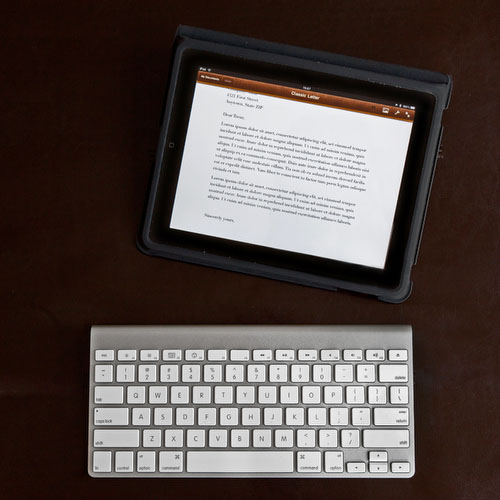Clean Writer 2.0 for iPad. (On sale now, dirt cheap.)
Even though one might say that the Macbook Air is much better for a traveling writer, with more power and flexibility, I dunno, there's just something about 1: using something for something it was not *really* meant for and using it well, and 2: Simplicity. One app at a time and the general simplicity of the iPad interface, used powerfully with an external keyboard, just appeals to me. (Apparently many people do very well even without an external keyboard, I envy them.)
... Of course there are many factors to weigh in, such as what apps you like and need, and that a laptop is faster to pack up and away than an iPad with keyboard, etc. But I just think this has some unique charm. And you can pack away the keyboard and use the iPad as ereader and all the things it's good for.


12 comments:
Writing is the one activity where a traditional GUI overlapping windows interface actually makes sense and increases productivity.
For writing is an organizing-the-desktop type of activity. You organize your research material, and the activity of moving them around on the desktop corresponds to the mental process of organizing your thoughts.
The research material used in writing can come in the form of any application. Not just the web browser, but also document viewers, social media interfaces, audio playback tools, OS utilities etc.
Yes, for that kind of writing I recommend a laptop and an app like Scrivener, which is very clever made to organize research and notes.
For people (projects) who write fully out of the head with hardly any referring to other materials, a distraction-free writing environment is good.
For people (projects) who write fully out of the head with hardly any referring to other materials...
I've never heard of such a person. Even when writing pure fiction, you need to look up the correct spellings of things and other details in Wikipedia etc.
Minette Walters, who writes crime novels, has two desktop computers (both with Window interfaces) in front of her at all times when writing.
Song lyrics, and lyrics in general, maybe a form of writing where all you need is a rhyming dictionary for research. But then, a notepad or a scrap piece of paper is all you need to write it down.
For me it's the other way around: I got very confused when I heard that some people used all kinds of notes and references when writing. I never do, when writing fiction, except perhaps a dictionary.
I'm in a writer's group occasionally, they use Alphasmart Neo machines, it's like a keyboard with memory. No internet, no nothing. They love it because it lets them concentrate on just writing.
So clearly there is a percentage of writers who do work like that. How big it is, I don't know.
Stopping to look up a detail will interrupt the flow of the writing. Some writers - me included - will insert reminders in the draft to look up the details after the first draft has been written. What is important is getting the first draft down so there is something to rewrite or edit.
I wrote a note on aforementioned group:
http://www.flickr.com/groups/alphasmart/discuss/72157628505358425/
(Durn blogger, why doesn't it make a link out of a link, or at least wrap it?)
http://alturl.com/c5oi8
I got very confused when I heard that some people used all kinds of notes and references when writing.
How do you convincingly describe a place without researching it over the network?
Unless, of course, the setting is an imaginary world à la Tolkien for which you can just make stuff up. But then you need to keep notes about your creation.
Some writers - me included - will insert reminders in the draft to look up the details after the first draft has been written.
Yes, this I also occasionally do. And it's the only way when the initial drafting is done using a voice recorder. But why would you want to switch from one word processor to another for editing? Why not use the better word processor from the outset?
The kind of things I write are not the kind of things where the exact geographical details are important.
"But why would you want to switch from one word processor to another for editing? Why not use the better word processor from the outset? "
For the same reason you don't use a heavy wrench to drive a nail. You are most times better off with the right specific tool for the job. When I'm writing a rough draft, my only concern is getting words on paper. The Alphasmart Neo doesn't even allow me to put an editors hat on (8 line liquid crystal screen).
I've of course spent much time before the rough draft working out details and the back story. I keep notes on my phone because it is always with me, in case I need to check something.
Different writers approach writing differently. I doubt there is one right way to do things.
Timo, you'd be surprised how much research notes were used by Tolkien. Most fantasy authors do need notes, some even write a dictionary of their invented language or a history of the setting (e.g. Howard).
Every writer has his own method. I scribble a story structure on paper, gather all needed info on internet (not while I am writing) then dictate a first draft using dictation software. If I'm not home, I type on the iPad using the simplest app possible.
Post a Comment